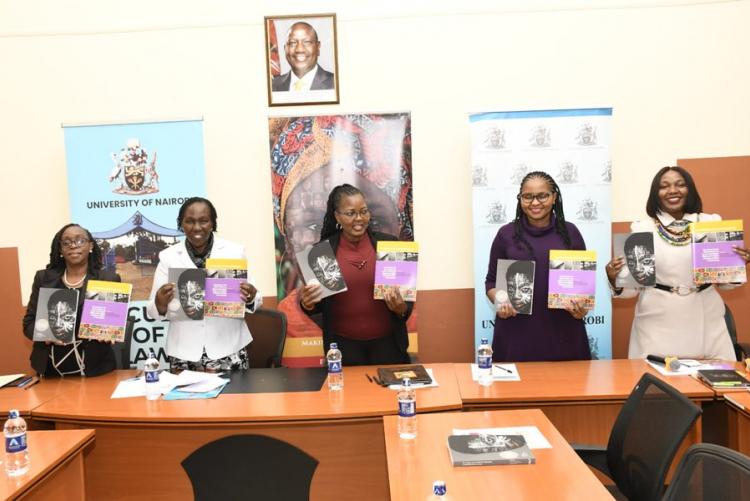On Thursday, July 13th 2023, The Faculty of Law at the University of Nairobi and the Centre for Human Rights at the University of Pretoria jointly launched two publications at the Parklands Campus. This event marked the celebration of the 20th anniversary of the Protocol to the African Charter on Human and Peoples' Rights on the Rights of Women in Africa, also known as the Maputo Protocol.
Speaking during this auspicious occasion the Principal Secretary, Gender and Affirmative Action represented by Ms Rhoda Misiko spoke candidly on the Maputo protocol and women’s rights ‘’The Maputo Protocol, ratified by 44 African Union member states including Kenya, plays a crucial role in advancing women's rights on the continent. Academic research and publication are vital in understanding and implementing the treaty's provisions. The academic community can provide valuable data and analysis, helping member states fulfill their reporting obligations and improve the credibility of state reports. Academic publications offer detailed insights into the impact of the treaty on women's lives and can inform advocacy efforts by local and international organizations. Increasing the body of scholarship on the Maputo Protocol is essential for effective implementation and the realization of gender equality in Africa.’’
On her part the DVC RIE Prof. Margaret J. Hutchinson, noted ‘’ Today, we commemorate the Maputo Protocol's 20th anniversary, a catalyst for change in women's rights and gender equality across Africa. The Protocol, adopted by the African Union in 2003, reflects African nations' commitment to gender equality, human rights, and social justice. It addresses unique challenges faced by African women, eliminating discrimination and violence while ensuring access to education, healthcare, and economic opportunities. Academia plays a crucial role in implementing the Protocol through research and publications that shape policies and drive social change. Collaboration between universities facilitates the exchange of ideas and best practices to meet the diverse needs of women. Let us reaffirm our commitment to the Protocol, supporting academia and fostering collaboration to realize women's rights and equality in Africa’’.
The Dean FOL Prof. Winfred Kamau noted on the long-standing partnership with the Centre for Human Rights, University of Pretoria. ‘’The Faculty of Law, University of Nairobi values its partnership with the Centre for Human Rights, reinforcing their commitment to advancing human rights, democracy, and the rule of law in Africa. This unique legal instrument, created by African women, reflects the voices of African women and enjoys regional credibility. The two publications, authored and edited by African scholars, exemplify the Protocol's spirit of Africans diagnosing and solving their own problems. These books highlight the role of academia in implementing the Protocol through knowledge production, dissemination, and community engagement.
The authors of the books also had an opportunity to engage the audience and discuss the publications. Annika Rudman, and Celestine Nyamu Musembi gave a commentary on ‘The Protocol to the African Charter on Human and Peoples’ Rights on the Rights of Women in Africa’. This publication aims to provide a systematic commentary of provisions of the Women’s Rights Protocol to elucidate their meaning and implications in improving women’s rights in Africa. It traces the legal, political, and economic foundation/justifications of the Protocol and its provisions. It analyses normative standards developed and institutional efforts made by the African Commission, the African Court and AU states to improve the protection of women’s rights in Africa. Susan Mutambasere, and Davina Murden gave highlights on the 2nd publication: ‘The Impact of the Maputo Protocol in selected African Countries’. This latest publication serves as an updated version of the previous collection of essays released by the Centre for Human Rights, which analyzed the influence of both the African Charter and the Maputo Protocol. While the previous editions, published in 2012 and 2016, covered a broader scope, this edition specifically concentrates on the Maputo Protocol. It examines the Protocol's impact on various aspects, including the legislative and policy framework, judiciary, academia, and its overall effect on women in 16 different African countries.
About the Maputo protocal
The Maputo Protocol, adopted in Maputo, Mozambique on July 11, 2003, is considered one of the most comprehensive and progressive women's human rights instruments globally. It was incorporated as an addition to the African Charter and guarantees extensive rights to African women and girls. The Protocol addresses various issues, including harmful traditional practices like child marriage and female genital mutilation (FGM), reproductive health and rights, political participation, economic empowerment, and the eradication of violence against women. Since its enforcement in 2005, 49 out of the 55 African Union Member States have signed it, and 42 have ratified it, making it one of the most widely ratified instruments in the African Union.

